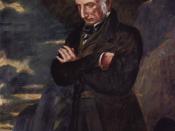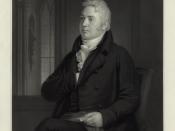Wordsworth has secured the reputation of being one of the great Romantic poets. His verse celebrates the moral influence exerted by nature on human thought and feeling. Considered one of England's greatest poets, he was a key element in the Romantic Movement; know especially for his love of nature, his poetry also resonated with deep philosophic questions. Although often viewed as a 'nature poet' his poetry is not simply concerned with scenic and descriptive evocations of nature, but also with the issues of Man, Human Nature and Man's relationship with the natural world.
Wordsworth's monumental poetic legacy rests on a large number of important poems, varying in length and weight from the short, simple lyrics of the 1790s to the vast expanses of The Prelude, thirteen books long in its 1808 edition. "Wordsworth argues that poetry should be written in the natural language of common speech, rather than in the lofty and elaborate dictions that were then considered poetic."
(SparkNotes). He argues that "poetry should offer access to the emotions contained in memory". And he argues, "The first principle of poetry should be pleasure, that the chief duty of poetry is to provide pleasure through a rhythmic and beautiful expression of feeling--for all human sympathy, he claims, is based on a subtle pleasure principle that is "the naked and native dignity of man." and makes up a significant part of Wordsworth's poetry (SparkNotes). Wordworth's style remains plainspoken and easy to understand even today, though the rhythms and idioms of common English have changed from those of the early nineteenth century. Many of Wordsworth's poems such as "Tintern Abbey" and the "Intimations of Immortality" deal with the subjects of childhood and the memory of childhood in the mind of the adult, childhood's lost...


